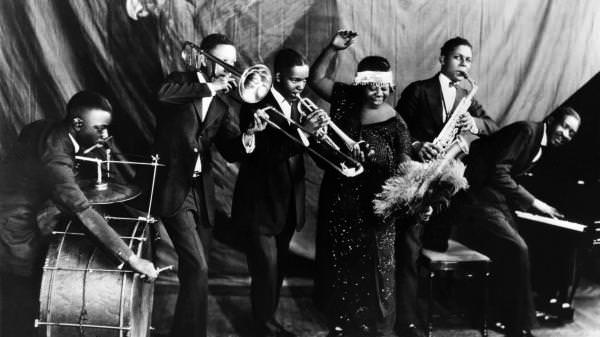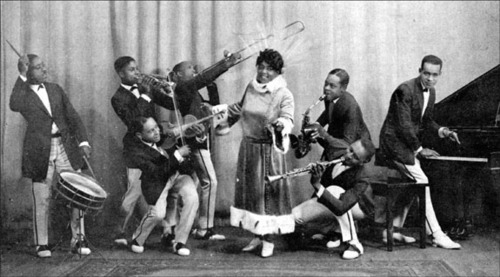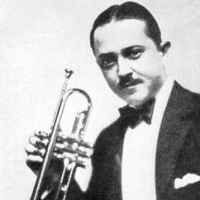
W.E.B. Du Bois and his NAACP colleague James Weldon Johnson asserted that the only uniquely “American” expressive traditions in the United States had been developed by African Americans. They, more than any other group, had been forced to remake themselves in the New World, Du Bois and Johnson argued, while whites continued to look to Europe or sacrificed artistic values to commercial ones. African Americans’ centuries-long struggle for freedom had made them the prophets of democracy and the artistic vanguard of American culture.

This judgment began unexpectedly to spread as African American music, especially the blues and jazz, became a worldwide sensation. Black music provided the pulse of the Harlem Renaissance and of the Jazz Age more generally. The rise of the “race records” industry, beginning with OKeh’s recording of Mamie Smith’s “Crazy Blues” in 1920, spread the blues to audiences previously unfamiliar with the form. Smith, Alberta Hunter, Clara Smith, Bessie Smith, and Ma Rainey—who had been performing for years in circuses, clubs, and tent shows—found themselves famous. Frequently ironic and often bawdy, the music expressed the longings and philosophical perspectives of the black working class. Black writers such as Langston Hughes, Sterling Brown, and Jean Toomer valued the blues as an indigenous art form of the country’s most oppressed people, a secular equivalent of the spirituals, and an antidote to bourgeois black assimilationism.
African-American migrants, drawn by wartime jobs, found a degree of creative freedom and fellowship in the North unheard of in Jim Crow Dixie. We remember this cultural flowering today as “the Harlem Renaissance,” a period when African-American artists, writers and poets produced works that celebrated their own traditions and cultures.
In the 1920s white Americans found this culture increasingly fascinating, and in New York adventurous whites made their way to Harlem, where they heard jazz bands play in segregated clubs. Langston Hughes later recalled the twenties as a time “when the negro was in vogue.” White patrons like Carl Van Vechten, the author of Nigger Heaven (1926), offered valuable support to artists like Hughes; they also confined them in stereotyped ideas of what “negro” literature and art should be.

African-American music, and more specifically Jazz, served as an anthem to whites like Van Vechten, impatient with the moral and personal restraints of their elders. Their view of African-American culture involved fantasies of escape from the pressure to work, from sexual restraint, from convention. The “white Negroes” of the 1920s projected their own desires onto black Americans, most frequently through music.
Milton “Mezz” Mezzrow grew up in a middle-class Jewish-American family in Chicago. A rebellious adolescent, he went to reform school at sixteen for car theft. There, in 1916, he heard African-American music for the first time. The singing of African-American inmates, he recalled in his autobiography Really the Blues, “hit me like a millennium would hit a philosopher.” Released from reform school, he began learning to play jazz clarinet by listening to the earliest recordings of Louis Armstrong, Sidney Bechet, and Joe “King” Oliver. A mediocre musician at best, he made his reputation in Harlem as primarily Louis Armstrong’s marijuana connection–in the forties, the word “mezzrow” or “mezzerole” came to refer to a particularly fat marijuana cigarette. Eventually, after years of living in Harlem, he came to regard himself as actually having become an African American. When the draft board listed him as “negro” in World War II, he was delighted. His genuine admiration however, was often mixed with crude stereotypes.

In his autobiography, Really the Blues, he wrote that from the moment he heard jazz he “was going to be a Negro musician, hipping the world about the blues the way only Negroes can.”
Mezzrow married a black woman, Mae (also known as Johnnie Mae), moved to Harlem, New York, and declared himself a “voluntary Negro”. He believed that “he had definitely ‘crossed the line’ that divided white and black identities”. In 1940 he was arrested in possession of sixty joints while trying to enter a jazz club at the 1939 New York World’s Fair, with intent to distribute. When he was sent to jail, he insisted to the guards that he was black and was transferred to the segregated prison’s black section. In Really the Blues, he wrote:
Just as we were having our pictures taken for the rogues’ gallery, along came Mr. Slattery the deputy and I nailed him and began to talk fast. ‘Mr. Slattery,’ I said, ‘I’m colored, even if I don’t look it, and I don’t think I’d get along in the white blocks, and besides, there might be some friends of mine in Block Six and they’d keep me out of trouble’. Mr. Slattery jumped back, astounded, and studied my features real hard. He seemed a little relieved when he saw my nappy head. ‘I guess we can arrange that,’ he said. ‘Well, well, so you’re Mezzrow. I read about you in the papers long ago and I’ve been wondering when you’d get here. We need a good leader for our band and I think you’re just the man for the job’. He slipped me a card with ‘Block Six’ written on it. I felt like I’d got a reprieve.
For Mezzrow, jazz was always about rebellion, a rejection of middle class respectability those “chumps who have to rise and shine each morning, slaves to the alarm clock.” A creative musician, he wrote, “was an anarchist with a horn.” But paradoxically, for black Americans musicianship was as often a badge of middle class success and respectability.

In his autobiography, Mezzrow vividly recalled another white Jazz musician, Leon “Bix” Beiderbecke. In popular culture Beiderbecke, the “young man with a horn,” symbolized “jazz age” rebellion and the romantic self destruction of youth in the twenties. Born in Davenport, Iowa, Beiderbecke grew up hearing the music of riverboat bands that came up the Mississippi from the deep South. He showed an early genius for the coronet. He also showed an early and intense fondness for whiskey, a fondness that killed him in 1932, at age 28. Widely regarded as the best white jazz musician of his time, Beiderbecke spent much of the twenties in Paul Whiteman’s big band. This three hundred pound White man, called “the king of jazz” in the popular press, offered what now sounds like a pallid, slick and bland version of jazz in his all-white orchestras. Beiderbecke’s story was made into a movie in 1950, Young Man with a Horn, starring Kirk Douglas.
Like Mezzrow, Beiderbecke spent his musical life in imitation of the sounds he heard from African Americans. He detested the segregation that prevented black and white musicians from recording together, but profited from it his entire career.
Louis Armstrong is universally recognized as the first great soloist in Jazz. His tone, phrasing, and easy rhythmic inventiveness were unprecedented. For men like Mezzrow and Beiderbecke, he represented the “authentic” sound they hoped to capture. Ironically, though men like Mezzrow cast him as the authentic voice of the rebellious downtrodden, Armstrong frequently claimed his favorite musician was the bandleader Guy Lombardo, whose smooth, finished sound formed an antithesis to his own. Armstrong fell from favor among many jazz listeners in the forties, partly because his willingness to entertain alienated African American musicians striving to redefine jazz as high art.
